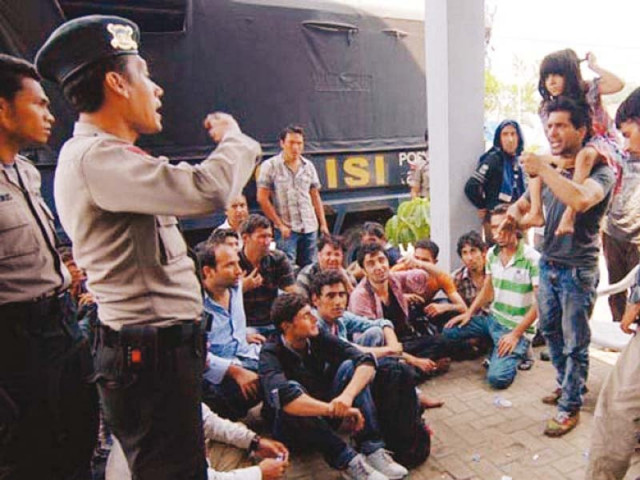Amnesty condemns 'forced' returns of Afghan asylum seekers
Returnees face an uncertain future in Afghanistan which is struggling with high unemployment

Asylum seekers from Afghanistan and Pakistan argue with Indonesian policemen at a temporary shelter in Merak, Indonesia. PHOTO: FILE
Almost 9,500 Afghans went back to their homeland in 2016 after their applications for asylum in Europe were rejected, compared with nearly 3,300 a year earlier, the human rights group said. The figure covers asylum seekers who were detained and then deported from European countries, and those who "ostensibly voluntarily" returned with financial assistance, Amnesty said.
Afghan asylum-seeker teen deported by Sweden killed in Kabul blast
Migration is a hot button issue in Europe and politicians are under pressure to bring down the number of asylum seekers after hundreds of thousands of migrants flooded the continent since 2015. "European governments are forcing increasing numbers of asylum seekers back to the dangers from which they fled, in brazen violation of international law," Amnesty said in a report, "Forced Back to Danger". The influx of returnees from Europe coincided with rising civilian casualties in Afghanistan's bloody conflict as Afghan security forces struggle to beat back Taliban and Islamic State militants in much of the country.
Nearly 11,500 civilians were killed or wounded in 2016 - one third of them children - according to the United Nations, the highest number of annual non-combatant casualties since it began collecting figures in 2009. Civilian casualties stayed at record highs in the first half of 2017 as the war enters its 16th year. As part of its research for the report Amnesty said it gathered testimony from 18 Afghan men, women and children "forcibly returned" to Afghanistan.
One woman sent back with her family from Norway said her husband was kidnapped and murdered a few months after they returned to Afghanistan. In another case a two-year-old child forced to leave Norway with his family was wounded in an Islamic State-claimed attack on a Shia mosque in Kabul in October 2016. "Wilfully blind to the evidence that violence is at a record high and no part of Afghanistan is safe, they are putting people are risk of torture, kidnapping, death and other horrors," said Anna Shea, Amnesty's researcher on refugee and migrant rights.
Amnesty called on European countries to suspend further deportations until the situation in Afghanistan "permits returns to take place in safety and dignity". The report comes after Germany resumed deportations last month, after suspending the process when a huge truck bomb hit the Afghan capital Kabul on May 31, killing about 150 people and wounding hundreds more. The latest group represented the sixth wave of repatriations of Afghans from Germany since December under a disputed Afghan-European Union deal aimed at curbing the influx of migrants.
106-year-old Afghan woman denied asylum in Sweden
Returnees face an uncertain future in Afghanistan which is struggling with high unemployment, a weak economy and masses of refugees being ejected from Pakistan and Iran, as well as hundreds of thousands of others uprooted by war. Some asylum seekers left Afghanistan when they were children and have no memories of the country, while others live in fear of persecution if the Taliban discover they are gay or no longer Muslim, Amnesty said.
"The same European countries that once pledged support for a better future for Afghans are now crushing their hopes and abandoning them to a country that has become even more dangerous since they fled," said Horia Mosadiq, Amnesty's Afghanistan researcher.



















COMMENTS
Comments are moderated and generally will be posted if they are on-topic and not abusive.
For more information, please see our Comments FAQ